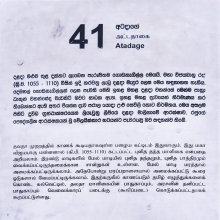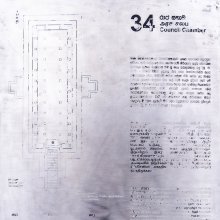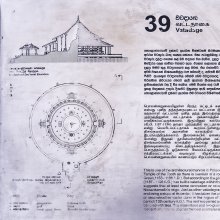Ulu, Uḷu: 7 definitions
Introduction:
Ulu means something in Buddhism, Pali, the history of ancient India, biology, Tamil. If you want to know the exact meaning, history, etymology or English translation of this term then check out the descriptions on this page. Add your comment or reference to a book if you want to contribute to this summary article.
Images (photo gallery)
India history and geography
Source: Shodhganga: Vernacular architecture of Assam with special reference to Brahmaputra ValleyUlu refers to Imperata cylindrical.—It appears in the study dealing with the vernacular architecture (local building construction) of Assam whose rich tradition is backed by the numerous communities and traditional cultures.

The history of India traces the identification of countries, villages, towns and other regions of India, as well as mythology, zoology, royal dynasties, rulers, tribes, local festivities and traditions and regional languages. Ancient India enjoyed religious freedom and encourages the path of Dharma, a concept common to Buddhism, Hinduism, and Jainism.
Biology (plants and animals)
Source: Wisdom Library: Local Names of Plants and DrugsUlu [उलू] in the Hindi language is the name of a plant identified with Imperata cylindrica Imperata cylindrica (L.) P.Beauv. from the Poaceae (Grass) family. For the possible medicinal usage of ulu, you can check this page for potential sources and references, although be aware that any some or none of the side-effects may not be mentioned here, wether they be harmful or beneficial to health.
Ulu [ঊলূ] in the Bengali language, ibid. previous identification.
Source: Google Books: CRC World Dictionary (Regional names)1) Ulu in Angola is the name of a plant defined with Hibiscus nigrocaulis in various botanical sources. This page contains potential references in Ayurveda, modern medicine, and other folk traditions or local practices It has the synonym Hibiscus cannabinus var. ruber A. Howard & G. Howard (among others).
2) Ulu in India is also identified with Flemingia chappar It has the synonym Maughania chappar (Buch.-Ham. ex Benth.) Kuntze (etc.).
3) Ulu is also identified with Flemingia strobilifera It has the synonym Moghania fruticulosa (Wall. ex Benth.) Wang & Tang (etc.).
4) Ulu is also identified with Imperata cylindrica It has the synonym Calamagrostis lagurus (L.) Koeler (etc.).
Example references for further research on medicinal uses or toxicity (see latin names for full list):
· The Grasses of Mauritius and Rodriguez (1940)
· Öfversigt af Förhandlingar: Kongl. Svenska Vetenskaps-Akademien (1855)
· Naturalientausch (1825)
· Flora (1846)
· Anales del Museo Nacional de Buenos Aires (1911)
· Hort. Bengal (1814)
If you are looking for specific details regarding Ulu, for example pregnancy safety, health benefits, extract dosage, chemical composition, side effects, diet and recipes, have a look at these references.

This sections includes definitions from the five kingdoms of living things: Animals, Plants, Fungi, Protists and Monera. It will include both the official binomial nomenclature (scientific names usually in Latin) as well as regional spellings and variants.
Languages of India and abroad
Pali-English dictionary
Source: BuddhaSasana: Concise Pali-English Dictionaryuḷu : (m.) star; constellation.
Source: Sutta: The Pali Text Society's Pali-English DictionaryUḷu, (Sk. uḍu, dialectical?) a lunar mansion Miln. 178. (Page 156)

Pali is the language of the Tipiṭaka, which is the sacred canon of Theravāda Buddhism and contains much of the Buddha’s speech. Closeley related to Sanskrit, both languages are used interchangeably between religions.
Kannada-English dictionary
Source: Alar: Kannada-English corpusUḷu (ಉಳು):—[verb] to cut and turn up soil with a plough; to make furrows in with a plough; to plough.
--- OR ---
Uḻu (ಉೞು):—[verb] to cut and turn up soil with a plough; to make furrows in with a plough.
--- OR ---
Ūḷu (ಊಳು):—
1) [verb] to utter a long, loud cry as from pain, anger, grief, etc. 2) to shout aloud to call a person from a distance.
2) [verb] (wolves, dogs, etc.) to utter a long loud, wailing cry.
3) [verb] to use coarse, insulting language; to rebuke in a sharp way.
4) [verb] to talk meaninglessly or worthlessly.
--- OR ---
Ūḷu (ಊಳು):—[verb] (correctly, ಉಳು [ulu]) to cut and turn up soil with a plough; to make furrows in with a plough; to plough.
--- OR ---
Ūḷu (ಊಳು):—[noun] a howling; a howl a) a long, loud, wailing cry of a wolf, dog, etc.; b) any similar sound as from pain, grief, etc.
Kannada is a Dravidian language (as opposed to the Indo-European language family) mainly spoken in the southwestern region of India.
Tamil dictionary
Source: DDSA: University of Madras: Tamil LexiconUlu (உலு) noun < உளு-. [ulu-.] Chaff of inferior grains; தினைமுதலியவற்றின் பதர். [thinaimuthaliyavarrin pathar.] (J.)
--- OR ---
Uḻu (உழு) [uḻutal] 1 transitive verb [Kanarese, Malayalam: uḻu, Travancore usage ūḍ.]
1. To plough; உழவ ருழுபடைக்கு [uzhava ruzhupadaikku] (நாலடியார் [naladiyar], 178).
2. To dig up, root up, as pigs; நிலத் தைக்கிளைத்தல். உழுது மாநிலத் தேனமாகி [nilath thaikkilaithal. uzhuthu manilath thenamagi] (தேவாரம் [thevaram] 929, 9).
3. To scratch, incise, as bees in a flower; கிண்டுதல். அறுகா லுழுமலர் [kinduthal. aruga luzhumalar] (இரகுவமிசம் தசரத. [iraguvamisam thasaratha.] 95).
4. To arrange or adjust, as the hair with the fingers; மயிரைக் கோதுதல். உகிரி னுழுதாங் கணிந்தாரே [mayiraig kothuthal. ugiri nuzhuthang kaninthare] (சீவகசிந்தாமணி [sivagasindamani] 2692).
--- OR ---
Uḻu (உழு) noun < உழு¹-. [uzhu¹-.] Mud gryllus; பிள் ளைப்பூச்சி. [pil laippuchi.] (W.)
--- OR ---
Uḻu (உழு) [uḻuttal] 11 intransitive verb < உளு-. [ulu-.] To decay, rot, putrefy; பதனழிதல். உழுக்குமூன் விதத் தையுண்டு [pathanazhithal. uzhukkumun vithath thaiyundu] (சிவதருமோத்தரம் சிவதரும. [sivatharumotharam sivatharuma.] 7).
--- OR ---
Uḷu (உளு) noun < உள்². [ul².] [Malayalam: uḷumbu.]
1. Wood-worm, wood-borer, wood-fretter; அரிக் கும் புழு. விண்ணுளு வுண்டென [arig kum puzhu. vinnulu vundena] (சீவகசிந்தாமணி [sivagasindamani] 1899).
2. That which is rotten; உளுத்தது. மிளகுளு வண் பான் புகல் [uluthathu. milagulu van pan pugal] (பழமொழி [pazhamozhi] 23).
--- OR ---
Uḷu (உளு) [uḷuttal] 11 intransitive verb < உளு. [ulu.] To be worm-eaten, as wood; to be eaten out by insects, as grain, as seeds; மரமுதலியவை புழுவால் அரிக்கப் பட்டுக் கெடுதல். [maramuthaliyavai puzhuval arikkap pattug keduthal.]
--- OR ---
Uḻu (உழு) [uḻutal] 5 intransitive verb cf. உகளு-. [ugalu-.] To leap; உகளுதல். (அகராதி நிகண்டு) [ugaluthal. (agarathi nigandu)]
--- OR ---
Uḻu (உழு) noun < உழவு. [uzhavu.] Ploughing; உழவு. ஒரு செய்யிலே செம்பாதி உழுமாயப் பாழாமா போலே [uzhavu. oru seyyile sembathi uzhumayap pazhamalaiyandathi pole] (நாலாயிர திவ்யப்பிரபந்தம் திருமாலை [nalayira thivyappirapandam thirumalai], 3, வ்யா. பக். [vya. pag.] 21, அரும். [arum.]).
Tamil is an ancient language of India from the Dravidian family spoken by roughly 250 million people mainly in southern India and Sri Lanka.
See also (Relevant definitions)
Starts with (+140): Ulluru, Ulu elihe, Ulu elise, Ulu kher, Ulu-hal, Ulua, Ulubalu, Ulubu, Ulucha, Uluga, Uluga, Ulugera, Ulugga, Ulugh-khan, Ulugi, Ulugisu, Ulugiti, Ulugu, Ulugugadare, Uluhal.
Ends with (+677): Accapulu, Achuramuulu, Adalavitulu, Adaluhulu, Adalvitulu, Adavi-kandulu, Adavi-uddulu, Adavigodhumulu, Adavinvvulu, Addugulu, Agulu, Ai-perukulu, Akar lulang bulu, Akkulu, Akpulu, Aligurulu, Amabulubulu, Amakulu, Amatungulu, Amazulu.
Full-text (+13): Uluvalaippu, Kai-tankiulu, Ulu-hal, Kuru ulu, Ulu elise, Mng'ulung'ulu, Ulu kher, Ulu elihe, Uluvan, Ulikku, Ulidu, Ulutakatu, Taban sakit ulu, Ulaan, Ulunilam, Ulumakan, Ulunar, Oru-calulu, Uttu, Tandulu.
Relevant text
Search found 5 books and stories containing Ulu, Uḷu, Uḻu, Ūḷu, Uzhu; (plurals include: Ulus, Uḷus, Uḻus, Ūḷus, Uzhus). You can also click to the full overview containing English textual excerpts. Below are direct links for the most relevant articles:
Chaitanya Bhagavata (by Bhumipati Dāsa)
Verse 2.23.188 < [Chapter 23 - Wandering about Navadvīpa On the Day the Lord Delivered the Kazi]
Verse 1.15.199 < [Chapter 15 - Marriage with Śrī Viṣṇupriyā]
Verse 1.15.105 < [Chapter 15 - Marriage with Śrī Viṣṇupriyā]
Chinua Achebe < [July – September, 1987]
Things Fall Apart in < [October – December, 1995]
Black Orpheus Unveiled: A note on African Writing in English < [January - March 1977]
Atharvaveda and Charaka Samhita (by Laxmi Maji)
Treatment of Skin diseases (Carmaroga) and Leprosy (Kuṣṭha) < [Chapter 3 - Diseases and Remedial measures (described in Atharvaveda)]
Vernacular architecture of Assam (by Nabajit Deka)
The gods of northern Buddhism (by Alice Getty)



